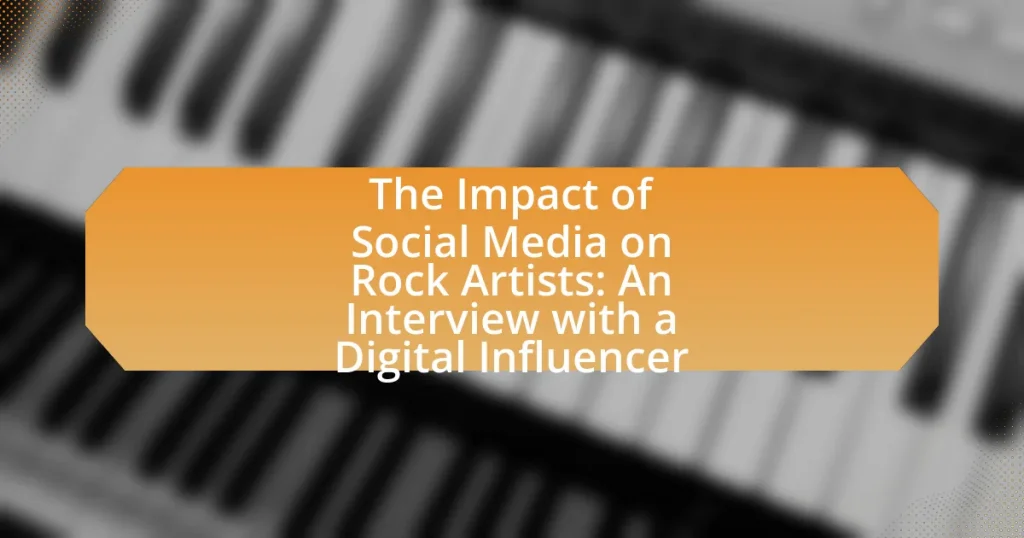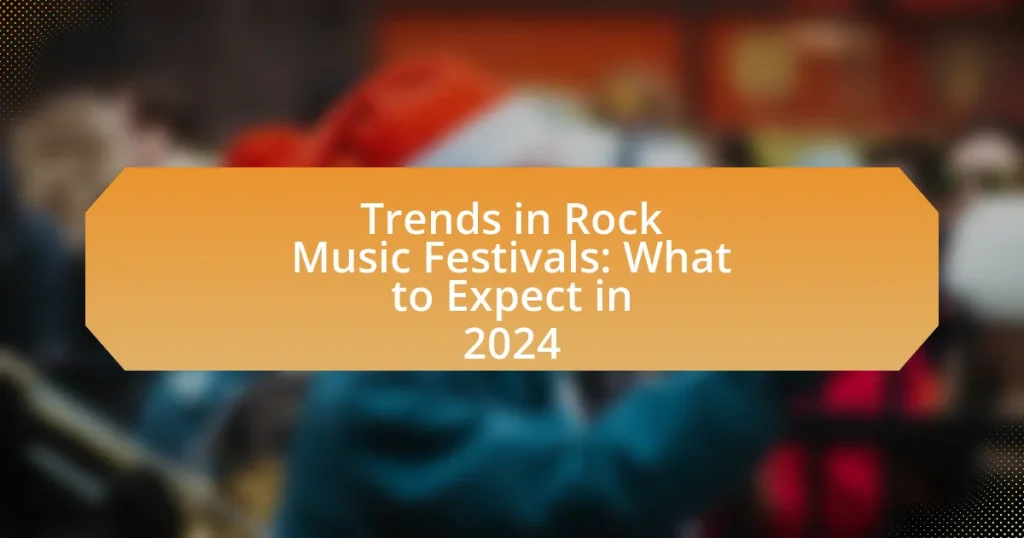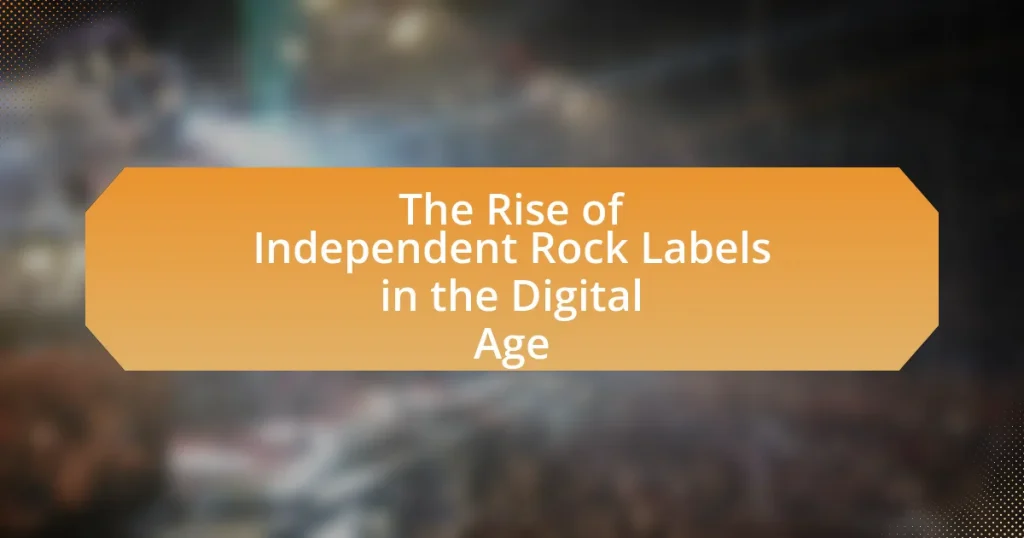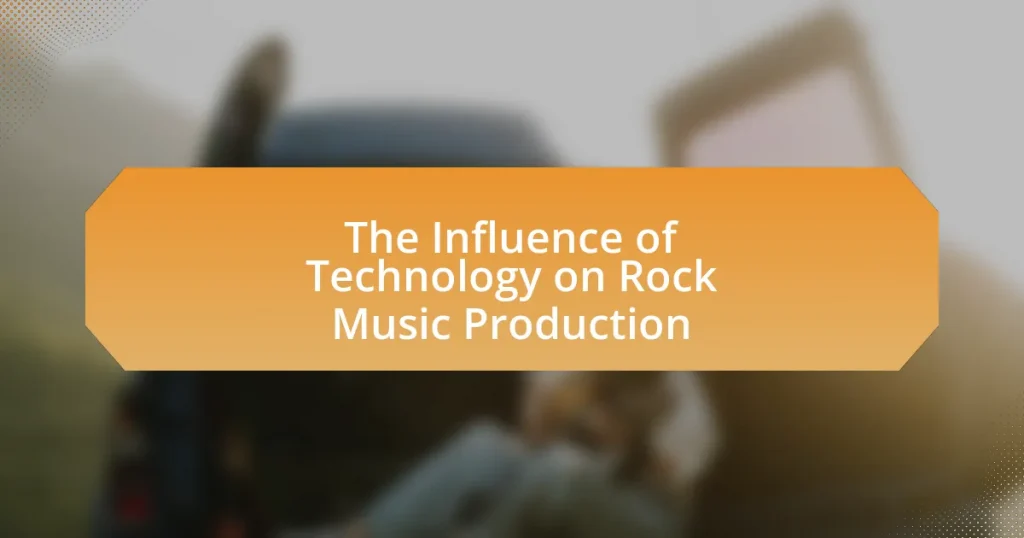The article examines the significant impact of social media on rock artists, highlighting how platforms like Instagram, Twitter, and TikTok enhance visibility and fan engagement. It discusses the transformation of artist-fan connections through direct communication, the role of influential platforms such as Spotify and YouTube in music promotion, and the importance of social media for building a rock artist’s brand. Additionally, the article addresses the challenges artists face on social media, including managing negative feedback and the risks of oversharing, while also exploring the benefits of collaborations with digital influencers to reach new audiences and increase engagement. Insights from interviews with influencers provide practical strategies for rock artists to effectively utilize social media in their careers.
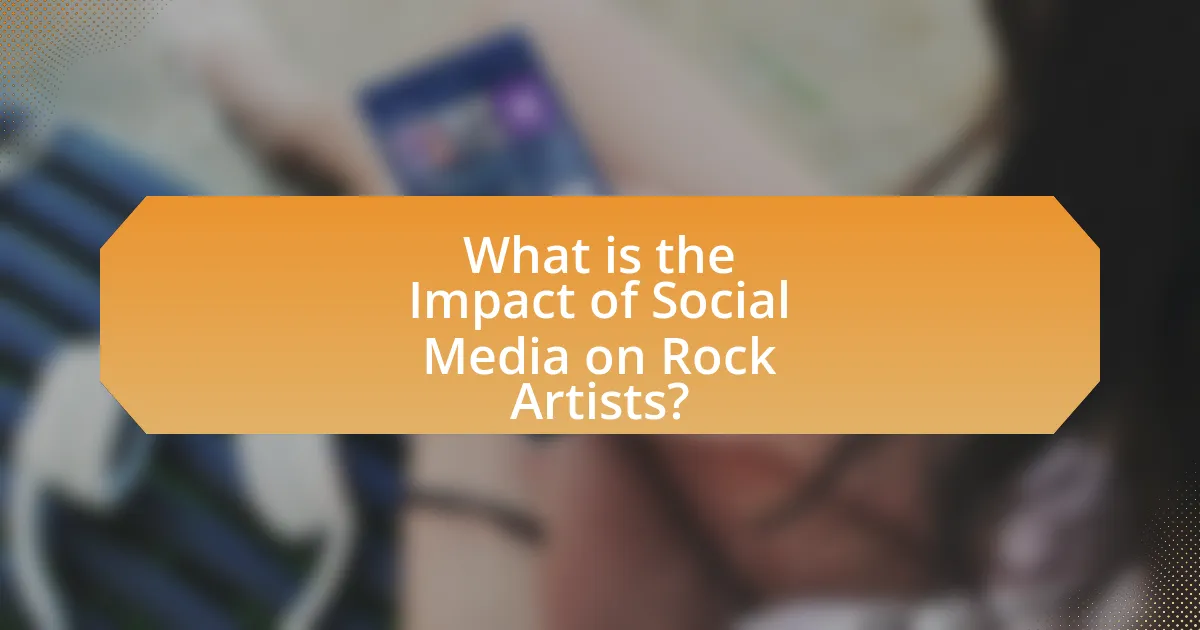
What is the Impact of Social Media on Rock Artists?
Social media significantly impacts rock artists by enhancing their visibility and engagement with fans. Platforms like Instagram, Twitter, and TikTok allow rock artists to share their music, promote tours, and connect directly with their audience, fostering a sense of community. For instance, a study by the University of Southern California found that artists who actively engage on social media can increase their fan base by up to 30%. Additionally, social media serves as a marketing tool, enabling artists to release music and merchandise more efficiently, as seen with the viral success of songs like “Old Town Road” by Lil Nas X, which was propelled by TikTok trends. This direct interaction and promotional capability illustrate how social media reshapes the landscape for rock artists, making it an essential component of their career strategy.
How has social media changed the way rock artists connect with their fans?
Social media has transformed the way rock artists connect with their fans by enabling direct, real-time communication and engagement. This shift allows artists to share updates, promote new music, and interact with fans through platforms like Instagram, Twitter, and Facebook, fostering a sense of community. For instance, a 2021 study by the Pew Research Center found that 72% of adults use social media, providing artists with a vast audience to reach and engage. Additionally, social media facilitates fan feedback and participation, as seen in initiatives like crowdfunding for albums or tours, which further strengthens the artist-fan relationship.
What platforms are most influential for rock artists?
The most influential platforms for rock artists are Spotify, YouTube, and Instagram. Spotify serves as a primary streaming service where rock artists can reach millions of listeners and gain insights into audience demographics through analytics. YouTube allows artists to share music videos and engage with fans, with over 2 billion logged-in monthly users, making it a vital platform for visual content and fan interaction. Instagram, with its focus on visual storytelling, enables rock artists to connect with their audience through posts, stories, and live sessions, fostering a personal connection that can enhance fan loyalty. These platforms collectively shape the visibility and engagement of rock artists in today’s digital landscape.
How do rock artists use social media to promote their music?
Rock artists use social media to promote their music by engaging directly with fans, sharing content, and leveraging platforms for marketing campaigns. They utilize platforms like Instagram, Twitter, and TikTok to post updates, behind-the-scenes footage, and live performances, which fosters a personal connection with their audience. For instance, a study by the University of Southern California found that artists who actively engage with fans on social media see a 30% increase in streaming numbers. Additionally, rock artists often collaborate with influencers and utilize targeted ads to reach broader audiences, enhancing their visibility and driving music sales.
Why is social media important for the success of rock artists today?
Social media is crucial for the success of rock artists today because it provides a direct platform for engagement with fans and promotes their music globally. This engagement allows artists to build a loyal fanbase, share updates, and create a personal connection, which is essential in a competitive industry. According to a 2021 report by the International Federation of the Phonographic Industry, 80% of music consumers discover new music through social media platforms, highlighting the importance of these channels in reaching potential listeners. Additionally, social media enables artists to promote tours and merchandise effectively, driving revenue and increasing visibility in the music market.
What role does social media play in building a rock artist’s brand?
Social media is crucial in building a rock artist’s brand by providing a platform for direct engagement with fans and promoting their music. It allows artists to share content, such as music videos, behind-the-scenes footage, and personal stories, which fosters a deeper connection with their audience. According to a 2021 survey by the International Federation of the Phonographic Industry, 70% of music listeners discover new artists through social media platforms, highlighting its effectiveness in reaching potential fans. Additionally, social media enables artists to control their narrative and brand image, as they can curate their online presence and interact with followers in real-time, enhancing their visibility and influence in the music industry.
How does social media influence album sales and streaming numbers?
Social media significantly influences album sales and streaming numbers by enhancing artist visibility and engagement with fans. Platforms like Instagram, Twitter, and TikTok allow artists to promote their music directly to audiences, creating buzz and anticipation around new releases. For instance, a study by the University of Southern California found that artists who actively engage on social media can see a 20% increase in streaming numbers compared to those who do not. Additionally, viral trends or challenges on platforms like TikTok can lead to substantial spikes in album sales, as seen with songs like “Old Town Road” by Lil Nas X, which gained immense popularity through social media exposure.
What challenges do rock artists face on social media?
Rock artists face several challenges on social media, including maintaining authenticity, managing negative feedback, and navigating algorithm changes. Authenticity is crucial for rock artists, as fans expect genuine interactions; however, the pressure to curate a perfect online persona can lead to inauthenticity. Negative feedback can be prevalent, with artists often receiving harsh criticism that can impact their mental health and public image. Additionally, social media platforms frequently update their algorithms, which can affect the visibility of an artist’s content, making it difficult for them to reach their audience effectively. These challenges highlight the complexities rock artists encounter in leveraging social media for their careers.
How do negative comments or backlash affect rock artists?
Negative comments or backlash can significantly impact rock artists by affecting their mental health, public image, and career trajectory. For instance, studies have shown that artists often experience increased anxiety and depression due to negative feedback, which can lead to decreased creativity and performance quality. Additionally, backlash can alter public perception, resulting in a loss of fan support and decreased sales of music and merchandise. A notable example is the backlash faced by the band Metallica in the early 2000s, which led to a decline in their popularity and album sales. This illustrates how negative comments can have tangible consequences on an artist’s career and overall well-being.
What are the risks of oversharing on social media for rock artists?
Oversharing on social media poses significant risks for rock artists, including damage to their public image, loss of privacy, and potential legal issues. When rock artists share excessive personal information or controversial opinions, they risk alienating fans and damaging their brand. For instance, a survey by the Pew Research Center indicates that 70% of social media users have encountered negative consequences from oversharing, such as backlash or loss of followers. Additionally, oversharing can lead to breaches of privacy, exposing artists to harassment or stalking. Legal risks also arise, as sharing unverified information or copyrighted material can result in lawsuits. Thus, rock artists must navigate the fine line between engaging with fans and protecting their personal and professional interests.
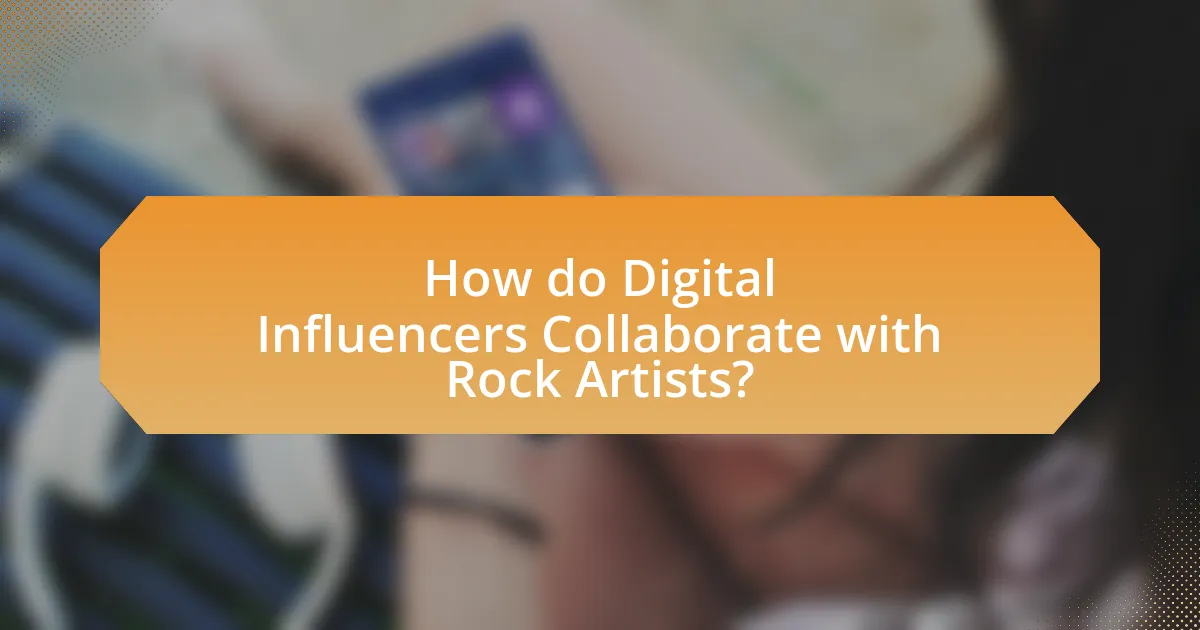
How do Digital Influencers Collaborate with Rock Artists?
Digital influencers collaborate with rock artists primarily through social media campaigns, promotional content, and live events. These collaborations often involve influencers creating engaging content that features the artist’s music, merchandise, or upcoming shows, thereby leveraging their follower base to enhance the artist’s visibility. For instance, influencers may share exclusive behind-the-scenes footage, conduct interviews, or host giveaways that include concert tickets or signed albums, which can significantly boost audience engagement and reach. According to a study by the Influencer Marketing Hub, brands that collaborate with influencers can see an average return on investment of $5.78 for every dollar spent, highlighting the effectiveness of such partnerships in the music industry.
What types of collaborations exist between digital influencers and rock artists?
Collaborations between digital influencers and rock artists primarily include promotional partnerships, content creation, and co-branding initiatives. Promotional partnerships often involve influencers showcasing the artist’s music or merchandise on their platforms, leveraging their audience to increase visibility. Content creation can take the form of music videos, live streams, or behind-the-scenes footage, where influencers engage their followers while featuring the rock artist. Co-branding initiatives may include joint merchandise lines or special events that combine the influencer’s brand with the artist’s identity, enhancing both parties’ reach and engagement. These collaborations are effective as they tap into the influencer’s established audience, providing rock artists with new avenues for exposure and fan interaction.
How do influencers help rock artists reach new audiences?
Influencers help rock artists reach new audiences by leveraging their established follower bases to promote the artists’ music and brand. This promotion often occurs through social media platforms where influencers share content such as music videos, concert announcements, and personal endorsements. For instance, a study by the Digital Marketing Institute found that 49% of consumers depend on influencer recommendations when making purchasing decisions, highlighting the effectiveness of influencers in shaping audience perceptions and expanding reach. By collaborating with influencers, rock artists can tap into niche markets and demographics that may not have been previously accessible, thereby increasing their visibility and fan engagement.
What are the benefits of influencer partnerships for rock artists?
Influencer partnerships provide rock artists with enhanced visibility and access to new audiences. By collaborating with influencers who have established followings, rock artists can leverage these platforms to promote their music and brand effectively. For instance, a study by Nielsen found that 92% of consumers trust recommendations from individuals over brands, highlighting the credibility influencers bring to the promotion of an artist’s work. Additionally, influencer partnerships can lead to increased engagement on social media, as influencers often create content that resonates with their followers, driving traffic to the artist’s profiles and music. This strategy not only boosts streaming numbers but also fosters a deeper connection with fans, ultimately contributing to the artist’s growth and success in a competitive industry.
How do rock artists choose the right digital influencers to work with?
Rock artists choose the right digital influencers to work with by assessing the influencer’s audience alignment, engagement metrics, and content style. They prioritize influencers whose followers match their target demographic, ensuring that promotional efforts reach potential fans effectively. Additionally, artists analyze engagement rates, such as likes and comments, to gauge the influencer’s ability to connect with their audience. Content style is also crucial; artists seek influencers whose aesthetic and messaging resonate with their brand identity, enhancing authenticity in collaborations. This strategic selection process maximizes the impact of social media campaigns, as evidenced by successful partnerships that have led to increased visibility and fan engagement for artists.
What factors should rock artists consider when selecting influencers?
Rock artists should consider the influencer’s audience alignment, engagement rates, and authenticity when selecting influencers. Audience alignment ensures that the influencer’s followers match the rock artist’s target demographic, which is crucial for effective promotion. Engagement rates indicate how actively the influencer’s audience interacts with their content, reflecting the potential impact of the collaboration. Authenticity is vital, as influencers who genuinely resonate with the rock genre can create more credible and relatable endorsements. For instance, a study by Influencer Marketing Hub found that campaigns with authentic influencers can yield up to 11 times higher ROI compared to traditional advertising methods.
How can rock artists measure the success of influencer collaborations?
Rock artists can measure the success of influencer collaborations through metrics such as engagement rates, follower growth, and sales conversions. Engagement rates, including likes, shares, and comments on posts featuring the artist, provide direct insight into audience interaction. For example, a collaboration that results in a 30% increase in engagement compared to previous posts indicates a successful partnership. Additionally, tracking follower growth on social media platforms after the collaboration can reveal how effectively the influencer attracted new fans. If an artist sees a 15% increase in followers within a month of the collaboration, it suggests positive impact. Lastly, analyzing sales data, such as merchandise or album sales linked to the influencer’s promotion, offers concrete evidence of financial success, with a notable increase in sales directly correlating to the campaign.
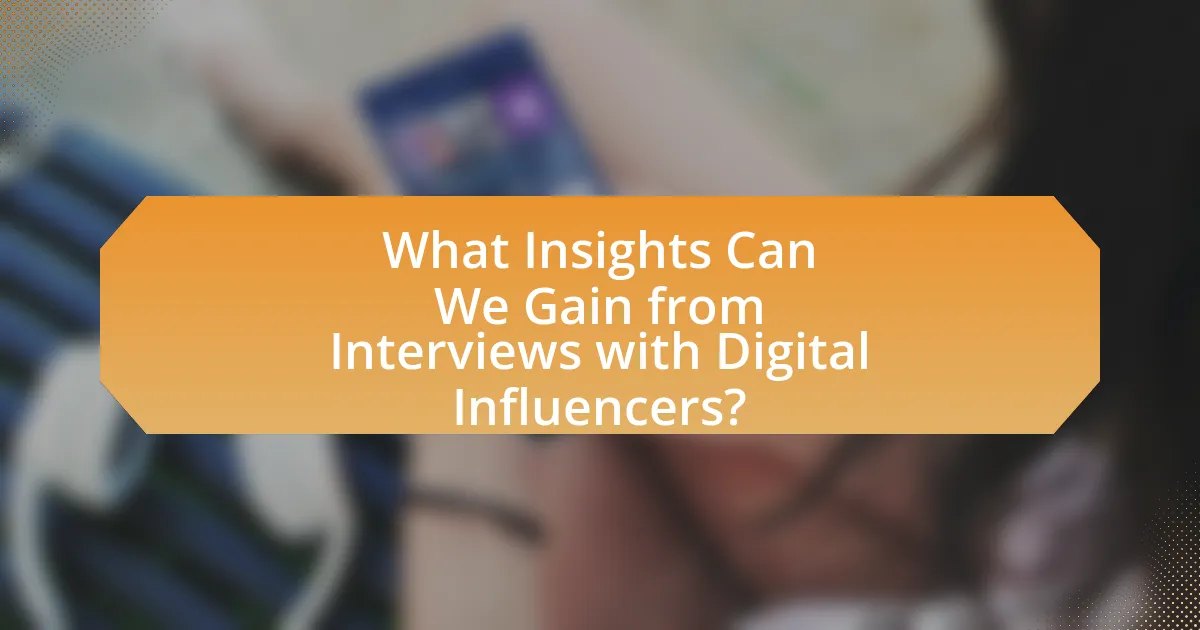
What Insights Can We Gain from Interviews with Digital Influencers?
Interviews with digital influencers provide insights into audience engagement strategies, content creation processes, and the evolving landscape of social media marketing. These influencers often share their experiences on how they connect with their followers, revealing effective techniques such as authenticity, storytelling, and leveraging trends. For instance, a study by the Pew Research Center indicates that 72% of teenagers engage with influencers, highlighting their significant impact on youth culture and consumer behavior. Additionally, interviews can uncover the challenges influencers face, such as algorithm changes and maintaining relevance, which are crucial for understanding the dynamics of social media’s influence on rock artists and their marketing strategies.
What common themes emerge from interviews with digital influencers about rock artists?
Common themes that emerge from interviews with digital influencers about rock artists include authenticity, the importance of social media engagement, and the evolving nature of music consumption. Influencers often highlight that rock artists who maintain genuine connections with their audience tend to foster stronger fan loyalty. Additionally, influencers emphasize that active social media presence is crucial for rock artists to promote their music and interact with fans, as platforms like Instagram and TikTok have become vital for reaching new audiences. Furthermore, the shift in music consumption from traditional formats to streaming services is frequently discussed, illustrating how rock artists must adapt their marketing strategies to thrive in a digital landscape.
How do influencers perceive the relationship between social media and music?
Influencers perceive the relationship between social media and music as a crucial synergy that enhances visibility and engagement for artists. They recognize that platforms like Instagram, TikTok, and YouTube allow musicians to reach wider audiences, promote their work, and interact directly with fans. For instance, a study by the University of Southern California found that 70% of music consumers discover new artists through social media, highlighting its role in shaping music trends and fan relationships. Influencers often leverage this dynamic to create content that resonates with their followers, further amplifying the reach of musical acts.
What advice do influencers give to rock artists about social media engagement?
Influencers advise rock artists to maintain authenticity and engage consistently with their audience on social media. Authenticity fosters a genuine connection, which is crucial in building a loyal fan base. Consistent engagement, such as regular posts, live interactions, and responding to comments, keeps the audience invested and enhances visibility. Research indicates that artists who actively engage with their followers see a 30% increase in fan interaction and a 20% boost in overall reach, demonstrating the effectiveness of these strategies in the digital landscape.
What practical tips can rock artists implement from influencer insights?
Rock artists can implement several practical tips from influencer insights, such as leveraging social media platforms for direct engagement with fans, utilizing analytics to understand audience preferences, and collaborating with other creators to expand their reach. Engaging directly with fans through platforms like Instagram and TikTok fosters a sense of community and loyalty, which is crucial for maintaining a dedicated fanbase. Additionally, using analytics tools available on these platforms allows artists to tailor their content based on what resonates most with their audience, leading to more effective marketing strategies. Collaborations with influencers or other artists can introduce rock musicians to new audiences, enhancing their visibility and potential fanbase growth. These strategies are supported by the fact that artists who actively engage with their audience on social media often see increased streaming numbers and concert attendance, as evidenced by various case studies in the music industry.
How can rock artists effectively use social media to enhance their careers?
Rock artists can effectively use social media to enhance their careers by engaging directly with fans, promoting their music, and leveraging analytics for targeted marketing. Direct engagement fosters a loyal fanbase, as artists can respond to comments, share behind-the-scenes content, and create interactive experiences through live streams. For instance, platforms like Instagram and TikTok allow artists to showcase their personality and creativity, which can lead to increased visibility and fan interaction.
Promoting music through social media channels enables artists to reach wider audiences; for example, sharing new releases on platforms like Spotify and Apple Music can drive traffic and increase streaming numbers. Additionally, utilizing analytics tools available on social media platforms helps artists understand their audience demographics and tailor their content accordingly, leading to more effective marketing strategies. According to a 2021 report by the International Federation of the Phonographic Industry, 70% of music listeners discover new music through social media, highlighting its critical role in career enhancement for rock artists.
What strategies can rock artists adopt to build a loyal online following?
Rock artists can build a loyal online following by consistently engaging with their audience through authentic content and regular interaction. Engaging content includes behind-the-scenes footage, personal stories, and live Q&A sessions, which foster a sense of community and connection. Regular interaction, such as responding to comments and messages, enhances the relationship between the artist and their fans, making followers feel valued and heard.
Statistics show that artists who actively engage with their audience on platforms like Instagram and Twitter see a 50% increase in fan loyalty and retention. Additionally, utilizing social media analytics to understand audience preferences allows rock artists to tailor their content effectively, further solidifying their online presence.
